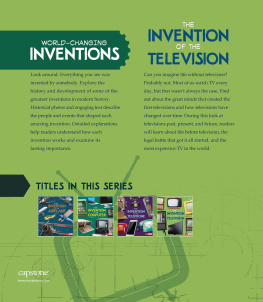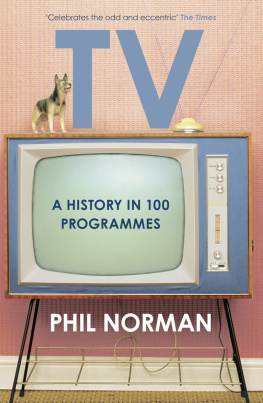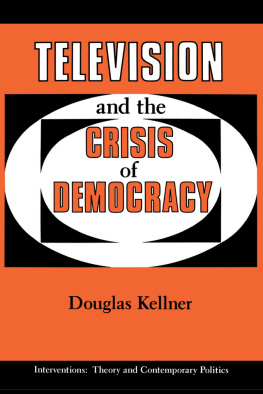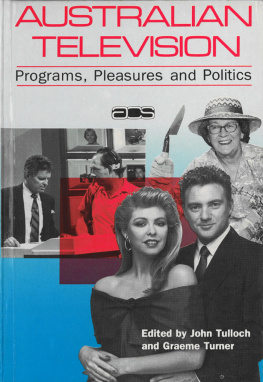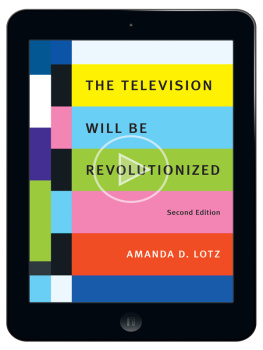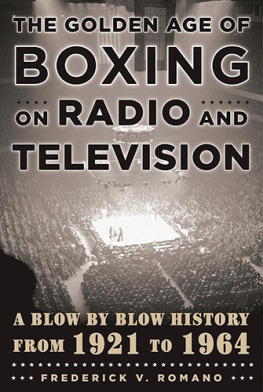Helen Wheatley is Associate Professor in Film and Television Studies at the University of Warwick, UK. She is editor of Re-viewing Television History: Critical Issues in Television Historiography (I.B.Tauris, 2007), co-editor of Television for Women: New Directions (2016) and author of Gothic Television (2006). Her research focuses on television history and aesthetics.
This superb book is no small accomplishment. Spectacular Television provides a painstaking archaeology of televisual excess as both a formal and industrial practice and places television in dialogue with an array of illuminating approaches. In doing so, Wheatley develops a precedent-setting research model and absolute must-read for television studies students and scholars everywhere.
Professor John T. Caldwell, UCLA, USA
Helen Wheatleys innovative Spectacular Television exposes our contemporary oversight of the significance of televisions visual strategies. Through a series of compelling case studies, and a fascinating history of television as technology, she demonstrates how television the apparent poor relation of cinema in terms of spectacle always enticed and continues to entrance audiences with images that variously provoke curiosity, wonder and disgust.
Professor Karen Lury, University of Glasgow
At last a book that really understands the vision part of television, and television studies. Helen Wheatley here rediscovers responses to the wide range of visual delights and shocks! that the medium has offered since its inception, highlighting television spectacularity through careful analyses.
Professor John Ellis, Royal Holloway, University of London
Spectacular
TELEVISION
Exploring Televisual Pleasure
HELEN WHEATLEY

Published in 2016 by
I.B.Tauris & Co. Ltd
London New York
www.ibtauris.com
Copyright Helen Wheatley
The right of Helen Wheatley to be identified as the author of this work has been asserted by the author in accordance with the Copyright, Designs and Patents Act 1988.
All rights reserved. Except for brief quotations in a review, this book, or any part thereof, may not be reproduced, stored in or introduced into a retrieval system, or transmitted, in any form or by any means, electronic, mechanical, photocopying, recording or otherwise, without the prior written permission of the publisher.
Every attempt has been made to gain permission for the use of the images in this book. Any omissions will be rectified in future editions.
References to websites were correct at the time of writing.
International Library of the Moving Image 23
HB ISBN: 978 1 78076 736 9
PB ISBN: 978 1 78076 737 6
eISBN: 978 1 78672 096 2
ePDF: 978 1 78673 096 1
A full CIP record for this book is available from the British Library
A full CIP record is available from the Library of Congress
Library of Congress Catalog Card Number: available
Contents
List of Illustrations
) The South Bank Exhibition: A Guide to the Story It Tells, London: HMSO: xix).
) The South Bank Exhibition: A Guide to the Story It Tells, London: HMSO: xxviii).
The Telekinema and the Television Pavilion at the Festival of Britain (1951) (Architectural Press Archive/RIBA Collections).
Inside the Telekinema at the Festival of Britain (1951) (John Maltby/RIBA Collections).
The television personality as lifestyle branding at the Ideal Home Show, 2015: Laurence Llewellyn Bowen.
The television personality as lifestyle branding at the Ideal Home Show, 2015: Gregg Wallace.
The Virgin Media Telly Heaven Smart Home at the Ideal Home Show, 2015.
The colonial view: Filming Wild Animals (BBC, 1954).
The colonial view: On Safari (BBC, 1957).
The artistically mutilated body: Hannibal (NBC, 201315).
An elegy for beautiful television? Frozen Planet (BBC1, 2011).
Television reconfigured as wall-hanging art (Coventry, UK, 2009).
The framed view of intentional landscape: Britains Favourite View (ITV, 2007).
A hesitation on intentional landscape: Wainwright Walks (Skyworks for BBC4, 2007).
Body horror in Incredible Human Machine (National Geographic, 2007).
Gunther von Hagens with cadaver in Anatomy for Beginners (Channel 4, 2005).
The ordinary spectacle of sex in Game of Thrones (HBO, 2011).
The object of the brazen gaze in Poldark (BBC1, 2015).
Symmetrical composition and the desirable/desiring body in Outlander (Starz, 2014).
Big-screen television viewing at the University of Warwick (photo courtesy of Sarah Wall).
Acknowledgements
This book has been a very long time in the writing and as such, a great number of people have played a part in its genesis, development and completion. All of my colleagues in the Department of Film and Television Studies at the University of Warwick, including the successive heads of department who helped me to find time to write various sections of the book, have aided me along the way; snatched conversations in the corridor and exchanges of emails and ideas have made this a much richer work. I am particularly grateful to Charlotte Brunsdon for her encouragement and for helping me to rethink my structure at a critical moment, and to all the other members of the Midlands Television Research Group for listening to my ideas about television spectacle over the last ten years. I have greatly valued talking about this work with Sofia Bull, as well as with the undergraduate students in the third-year module Television and Audio Visual Cultures, and my brilliant TV-focused PhD students Tom Steward, Charlotte Stevens and Ze Shacklock, who have all taught me a great deal about television.
My friend and colleague Rachel Moseley has read every part of this book as it has slowly developed; she has copy-edited, pushed and challenged my ideas, and encouraged and supported me, and it is no exaggeration to say I couldnt have done it without her. I am most fortunate to have worked with Rachel and with Helen Wood, both brilliant television scholars and brilliant friends, on other research projects during the writing of this work. They have both enriched the ideas in this work. I am also immensely grateful to my friends and colleagues Tracey McVey, Anne Birchall and Heather Hares for their support and good humour throughout the research period.
A book which is partly about television history cannot be written without the support of a whole host of archivists and librarians: I have been particularly grateful for the help of Jess Hogg at the BBC Written Archives, Andy ODwyer and Tony Ageh at the BBC, the staff of the Archive of Art and Design at Blythe House, and Richard Perkins in the University of Warwick library (who is a master at spotting relevant reading in obscure journals and is generally the fount of all knowledge). I am also indebted to everyone who gave up time to participate in the audience research which lies at the heart of several chapters in this book, from the people who discussed their picnics with me at TheBlue Planet Prom in the Park to those who were absolutely candid about their erotic relationship with television. I didnt blush much.
As with any research project, being invited to present your ideas at critical stages in their development has a huge impact on the work. I am indebted to the following colleagues and all attendees who listened and responded to my work at the events where invited me to speak: Mandy Merck and James Bennett at Royal Holloway; James Fenwick, Laura Mee and Johnny Walker at De Montfort University; Yelda zkoak at Uak University; Alex Clayton and Sarah Street at the University of Bristol; Lisa Taylor at Leeds Metropolitan University; Therese Davis and Adrian Martin at Monash University; Anna Reynolds Cooper at the University of Warwick; Joanne Hollows at Nottingham Trent University; Nicky North at the BFI; Lynn Spigel and Max Dawson at Northwestern University; and Jamie Sexton at the University of Wales, Aberystwyth. Some of the chapters in this book are based on previously republished work: my thanks therefore go to Ann Gray and the editors/reviewers at the
Next page

